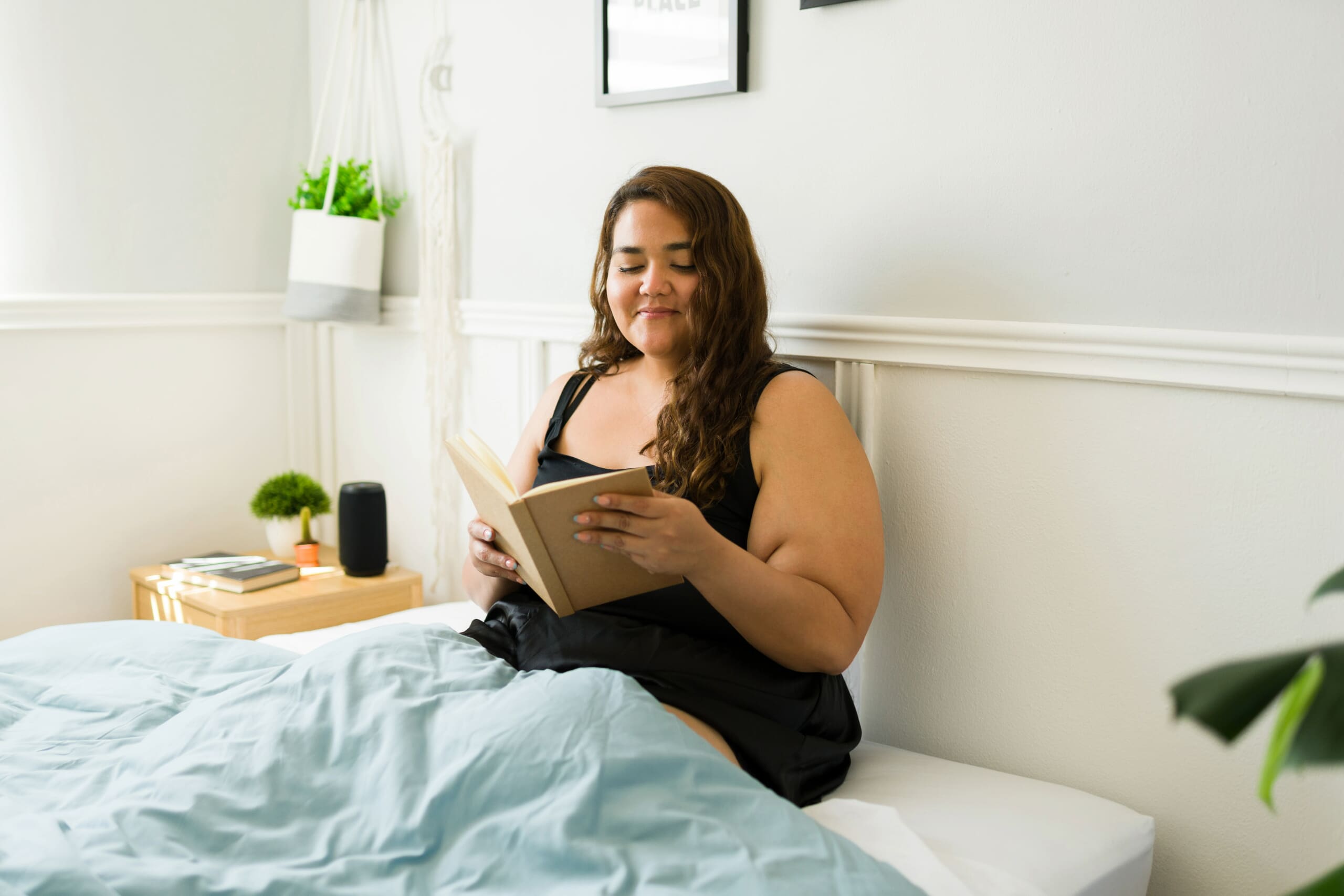Whether it’s taking a relaxing bath when we get in from work, or enjoying quiet 20 minutes of meditation before bed, we all have our own personal evening routines that we like to indulge in to relax before turning in for the night.
And, of course, for many of us, these bedtime routines might also include reading whatever exciting or interesting book we happen to have our nose buried in that week – because there really is nothing quite like curling up in your duvet with a page-turner nestled in your lap.
However, while sitting in bed with a good book is certainly a well-trodden pastime, does reading help your sleep, or does it actually make it worse? Are there actually any benefits to reading before bed?
To find out, we looked at the science behind the impact of reading before bed, the benefits of reading before sleeping, the downsides of certain modern bedtime reading habits, and how you can easily incorporate reading into your nighttime routine if you’re looking to read more in the future.

Is it good to read before bed?
If you’re an avid book reader who loves nothing more than to hop into the written page from the comfort of your pillows, then don’t worry, because we have good news for you!
Whether it’s just 10 minutes before you flick the lights out or an engrossing 30 minutes as you reach the climax of the novel, numerous studies have shown that reading before bed has plenty of psychological and physical benefits for us.
In fact, traditional bedtime reading appears to have next to no downsides (unless, of course, you get so caught up in your latest book that you wind up reading until the early hours of the morning), however, certain modern reading habits are starting to show their downsides.
What are the benefits of reading before bed?
We could highlight hundreds of benefits of reading before bed for you here. However, to save your reading energy for the good stuff later in the evening, we’ve stuck to outlining the core benefits of reading before sleeping, below:
- Reduced stress – perhaps the biggest benefit of reading before bed, studies have shown that reading books are great way to decrease stress and take your mind off things, in some cases having as much impact as meditation or yoga. Essentially, reading means you’re so busy focused on the pages in front of you, that you forget about whatever was stressing you out, allowing your body and mind to more easily relax.
- Better sleep – although reading requires you to mentally engage with the words on the page, thanks to its non-digital nature, traditional reading can actually help to de-stimulate the brain. This, in turn, increases melatonin (the sleep hormone) production by relaxing the body, while also helping to tire your mind through continued concentration.
- Improved concentration – and speaking of concentration, reading naturally requires users to focus in order to understand and follow the flow of the story or non-fiction concepts being presented to them. As a result, regular reading can improve your general concentration as a whole, as well as your focus in other areas of your life.
- Varied vocabulary – part of reading, especially with informational content, often means being exposed to more complex or unfamiliar words. These are often hard to pronounce or understand initially, but the more you read, the wider your vocabulary and lexicon will become, allowing you to understand and enjoy more complex works of literature.
- Boosted cognition – although not clinically proven at this stage, a large number of in-depth studies suggest that consistent reading, much like physical exercise, has the potential to reduce cognitive decline as you get older by helping your mind stay active through regular mental workouts.
- Enhance creativity – finally, thanks to the many varied genres, worlds, and topics held in books, reading is widely considered to be one of the best ways to improve your creativity through exposure to different viewpoints, character arcs, storylines, and new ways of thinking.
What are the benefits of reading to children before bed?
Just like how reading as an adult has many benefits, the same is also true when it comes to reading to children, which is why a substantial number of experts in the field recommend that parents make reading an essential part of their child’s bedtime routine.
Simply put, by reading to your child before bed, you can help them expand their vocabulary faster, improve their own reading skills including pronunciation and reading flow, encourage independent reading in their downtime as a healthier alternative to screen use, and promote their innate curiosity by boosting their imagination!

Are there any downsides to reading before bed?
While there are many great benefits to reading before bed, modern evening reading trends have begun to flag several downsides to doing so – specifically if you happen to be reading using an e-book rather than a physical book.
This is because e-books, no matter how specialised for reading they might be, all produce some degree of blue light through their screens. Exposure to bright light before bed has already been shown to make it harder to get to sleep, but bright blue light also causes a reduction in melatonin production, causing your body to stay awake.
As a result, even if you only read for a few minutes on an e-book before bed, you’ll likely find it that much harder to get to sleep quickly, and you’ll likely get a smaller amount of REM or deep sleep as a result.
And, on top of all that, phones and tablets all have many other distractions installed that are designed to keep you on them, preventing you from focusing on whatever you’re reading and potentially leaving you doom-scrolling well into the night, rather than finishing your book.
Do audiobooks have any sleep benefits?
Although e-books have a bad reputation for hindering sleep, the same is not true for audiobooks. In fact, many experts argue that audiobooks have similar, if not more benefits when compared to traditional bedtime reading.
For one thing, with audiobooks, you don’t have to hold a physical book, allowing you to really get comfy as you settle down to relax. Alongside this, you’re also not looking at a screen or page, allowing your body to naturally wind down in preparation for sleep while still granting all the concentration and focusing benefits we outlined above.
Of course, the one downside of audiobooks is that you might drift off before they finish, meaning you could miss essential plot points or information, but most audiobooks get around this by providing you with settings that will stop your book after a certain number of chapters or specified length of time.

How can you incorporate reading before bed into your bedtime routine?
So, now that we know that reading before bed does indeed have several fantastic benefits associated with it, how exactly can you go about readily incorporating nighttime reading into your evening routine without disrupting it?
Well, for starters, if your bedtime routine already includes a core relaxation step, such as some light-stretching or sitting down with a cup of sleep-enhancing herbal tea, then the logical answer is to simply have your audiobook or physical book to hand so you can pick it up when you go to do this activity.
Of course, if it’s regular reading that’s proving to be a challenge, then the important thing is to pick a book you know you can be consistent with. For example, some readers like to rotate between a few books at a time to keep the content of what they’re reading more novel.
Alongside this, one of the best ways to prompt yourself to read more in the evening is to do all your other bedtime routine stuff first, such as brushing your teeth, showering, etc., before wrapping up under your duvet and grabbing your book – that way you’ll have no barriers between you and getting engrossed in your book.
And finally, if reading is something you want to do but haven’t done so in a while, then there’s nothing wrong with starting small. Even reading for as little as 20 minutes is enough to start forming a reading habit, and it’ll only grow from there.
What is the best genre to help you sleep?
Lastly, when it comes to the best genres to read before bed, it all comes down to personal preference. If you like rip-roaring thrillers, then pick up whatever’s next on your list and get started! Or if you prefer non-fiction, why not grab a notepad so you can jot down interesting points as you go?
Anything is on the table when it comes to reading genres before bed. However, experts do point out that it’s better to avoid anything that might frighten or disgust you (for obvious reasons).
Naturally, if you’re new to reading and don’t know where to start, then we’d recommend going with a book genre that’s similar to what you enjoy watching on TV or online. For example, if you enjoyed Game of Thrones while it was on, then what better way to get into reading than trying the books the show was based on for yourself?

Other ways to improve your sleep
So, now you know all about the benefits associated with reading before bed, and how you can start making reading an essential part of your nighttime routine going forward. However, bedtime reading can only do so much to improve your sleep if you're lacking in other areas. From supportive mattresses to sleep tips, we've got you covered.
We've also got hundreds of children's mattresses and kids' beds that can enhance your little one's bedroom to create the perfect place to adopt reading to them before bed!






